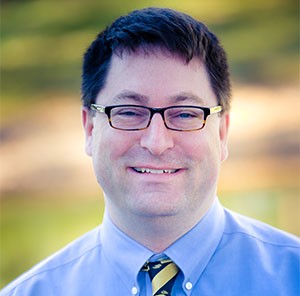Meet Assistant Director John Miner
September 16, 2015
 John Miner is an Assistant Director in the Office of Technology Transfer (OTT), where he has been working since 1999, starting as a student assistant. He received his BA in Organization Communications with a minor in Space Studies and his MS in Research Administration from UCF. Miner is also a licensing associate and works with a variety of departments and research institutes within the physical sciences. “Our job here in OTT is a bit of cheer leading, to help people see the potential and the possibilities of new research and technology. To help people understand that when you become our partner, you’re not just getting a piece of paper with a patent on it. You’re getting a true partnership and the full force of the University is behind that.”
John Miner is an Assistant Director in the Office of Technology Transfer (OTT), where he has been working since 1999, starting as a student assistant. He received his BA in Organization Communications with a minor in Space Studies and his MS in Research Administration from UCF. Miner is also a licensing associate and works with a variety of departments and research institutes within the physical sciences. “Our job here in OTT is a bit of cheer leading, to help people see the potential and the possibilities of new research and technology. To help people understand that when you become our partner, you’re not just getting a piece of paper with a patent on it. You’re getting a true partnership and the full force of the University is behind that.”
At the center of it all is a flurry of constant communication: emails, contracts, agreements, journal articles, technical papers, meetings, and discussions. “It’s a lot of reading and comprehension, especially when you’re talking about a lot of legal documents and negotiations. It’s the subtle difference between version one and version two. Just changing a couple of words can completely change the scope and feel for the agreement,” he said.
Miner reflected on two licensing experiences that he’s especially proud of—and one of them may even be in your home: the Gossamer Wind Fan. “It has been a phenomenally successful commercial product that’s in the hands of a lot of people. It was one of the first licensing agreements that I ever worked on. It brought a lot of revenue to the University, and to the faculty member, and the technology is out in the marketplace. It was a very tangible product to see and understand.”
The other licensing experience involved a faculty-led startup company, which is headed by Leon Glebov, Ph.D. from CREOL [The College of Optics and Photonics]. “It has proven to be a really good, long-term partnership with open communication and clear understanding that each of us is trying to get a win-win for both sides.” According to Miner, OptiGrate has been the archetypal startup, with increasing research supported by many contracts and grants, including federal government STTR (small business technology transfer) grants.
So how can the licensor/licensee relationship become a win-win partnership? Miner had some advice for researchers developing innovative technologies: disclose your inventions to OTT early, in advance of any publications or presentations to allow OTT to capture the inventions as broadly as possible to maximize their value and commercial potential.
For the entrepreneur or industry partner looking for new technologies to invest in, experience is crucial for success. Miner believes that an ideal licensee is “a successful entrepreneur, or someone who has a successful track record in commercializing technology from a university.” He remarked that a key ingredient for a successful licensing relationship is open and honest communication. He also finds that integrity goes a long way—the ability to keep one’s word and to follow through.
As someone who has been at UCF since he was a student, Miner’s longevity in OTT, as well as his passion for the University, informs his work: “I am an eternal supporter of UCF. I’m proud of all that I’ve participated in and seen since the first day that I stepped onto this campus. Most of what we’re doing here is cutting and blazing trails, and that’s hard work. If I can be around that innovative work and assist inventors, I feel like I’m doing something worthwhile.”
For more information about partnering with UCF to bring ideas to the marketplace, contact John Miner.
Written by Deborah Beckwin